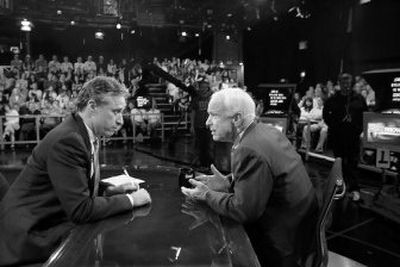McCain seeks to jump-start ‘08 launch

MANCHESTER, N.H. – John McCain will formally launch his bid for the White House today in the state that vaulted him to national prominence eight years ago, and if a candidate from either party needs a fresh start, it’s the embattled Arizona senator.
McCain has seen former New York Mayor Rudolph Giuliani surge past him in national polls testing the strength of the GOP field. His fundraising in the first quarter was disappointingly anemic and his candidacy has been defined almost exclusively by his public advocacy for President Bush’s unpopular troop surge policy in Iraq.
“It’s a far more competitive race than it was six months ago, but I think people continually have a tendency to jump to premature conclusions about political campaigns,” said Whit Ayres, a Republican pollster not currently working for any of the candidates, adding McCain’s “national stature is so great and the campaign’s fundraising potential is so great that it would be a serious mistake to write him off prematurely.”
Giuliani’s rise has reshaped the GOP race early this year, but none of the major candidates has a strong grip on the Republican coalition. Former Massachusetts Gov. Mitt Romney has struggled to rise above single digits in national polls. Recent stirrings by former Tennessee Sen. Fred Thompson have sparked enough interest that he is now competitive with Romney in national surveys.
Still, it is McCain who has the most to prove at this point, and he may have limited time to demonstrate that he and his campaign are once again on track. His own advisers say their first priority is to raise $20 million or more between now and the end of June to put to rest doubts about the senator’s appeal to Republican donors.
The shakeup of the McCain fundraising operation, which began last month when former Texas representative Tom Loeffler was put in charge of the organization, continued Tuesday. Carla Eudy was replaced as finance director by Mary Kate Johnson.
Another goal is to broaden the definition of McCain’s candidacy, which has been singularly focused on Iraq. “Because the war was going badly, that defined John more tightly than anyone wanted,” said one official who declined to be identified in order to speak freely about internal campaign issues.
McCain has sought to diversify his message with recent speeches on the economy and energy and global climate change, but Iraq remains the overriding issue hanging over his candidacy.
John Weaver, McCain’s chief strategist, said the Arizona senator remains well positioned to compete for the nomination, noting that McCain is either tied or leading in polls in Iowa, New Hampshire and South Carolina. He also said McCain has better organizations than his rivals. “We wouldn’t trade places with anybody,” he said.
McCain will restart his campaign in New Hampshire, the state that made him a national power within the Republican Party with his victory over Bush in the 2000 primary. His tour will then take him to South Carolina, where he was thrashed by Bush, and to Iowa, which he skipped during his first campaign. After a stop in Nevada, he will end with a rally in Arizona.
“I think that without a doubt the American people, beginning (today), are going to see the most experienced candidate in either party and the only one who’s willing to put principle above politics to get this country moving forward,” Weaver said.
McCain’s support for the war has made him far less popular among independents and Democrats, according to Washington Post-ABC News polls. Over the past 11 months, the percentage of Democrats who say they definitely would not vote for McCain were he the nominee has risen by 30 percentage points, and among independents it has jumped by 16 percentage points.
Among Republicans, however, the war has had only minimal impact on McCain. The percentage of Republicans who said they will definitely not vote for him in the general election has risen from 20 percent in May 2006 to 25 percent in the most recent poll. But among Republicans, the percentage who said they definitely will vote for him has risen by 15 percentage points.
Strong anti-war sentiment fueled Democratic victories in New Hampshire last November, and McCain could suffer if independents who supported him there in 2000 turn against him, or simply choose to vote in the Democratic primary.
Still, Tom Rath, a New Hampshire Republican strategist and Romney adviser, believes McCain remains well-positioned in New Hampshire. “He’s got a great organization,” he said. “The people who were with him remain with him. … If there’s any place that’s a firewall, it’s New Hampshire.”